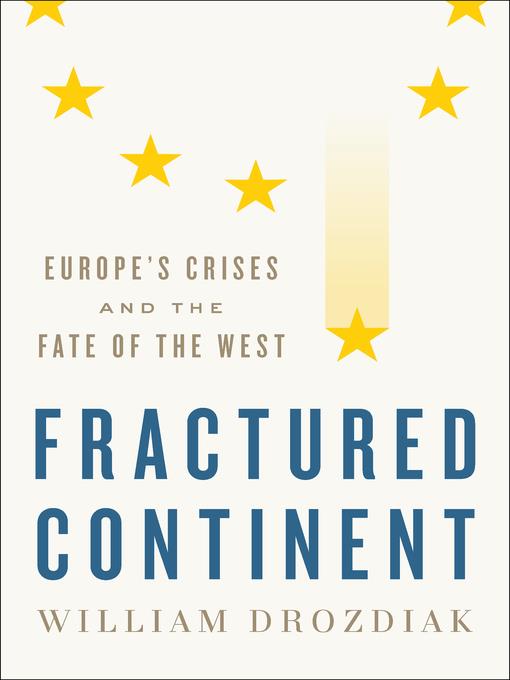
Fractured Continent
Europe's Crises and the Fate of the West
کتاب های مرتبط
- اطلاعات
- نقد و بررسی
- دیدگاه کاربران
نقد و بررسی

July 15, 2017
A snapshot of European capitals frozen amid turmoil, from Berlin to Athens.What former Washington Post chief European correspondent Drozdiak sees as the noble European experiment of a united democratic order since the end of the Cold War--undergirded by the three initiatives of the expansion of NATO, the creation of the euro, and passport-free travel within Europe--seems now to be imploding from within. What happened? A revanchist, nationalist stance has emerged in many countries, a North-South split due to Germany's economic predominance versus the south's debt-heavy load, and the influx of refugees from Africa and the Middle East are challenging the social and economic order. Indeed, the fracturing has already occurred with Britain's stunning vote to leave the European Union after more than four decades of membership. Drozdiak cites "scare tactics about unchecked immigration" as being a major reason, compounded by an "antiglobalization backlash." In France, growing class conflict led to the rise of Marine Le Pen's far-right party, which underscores the need "to restore respect for law and order, curtail Muslim immigration, and revive French national identity." These themes continue to play out in other capitals. Angela Merkel's bold decision to open Germany's borders to refugees led to enormous criticism, while overall, Europe is feeling helpless to halt the influx as well as impotent to restrain Russia's territorial aggression in Ukraine and elsewhere. In Spain, unemployment is very real, especially among young people; the country suffered through a crippling economic recession, while the "Catalan question" has taken on new strength. Hungary has erected wire fences along its border to obstruct refugee crossings, and Matteo Renzi, Italy's youngest-ever center-left prime minister, boldly stood up to challenge Merkel's austerity programs. Drozdiak pursues policies in Warsaw, Copenhagen, Riga, and Ankara, and he explores how Europe must deal with Moscow's "traditional paranoia about being encircled by the West." A timely, useful study of how the new reality of a "post-Washington Europe" may revive old demons of nationalism.
COPYRIGHT(2017) Kirkus Reviews, ALL RIGHTS RESERVED.

Starred review from October 2, 2017
Drozdiak, former Washington Post chief European correspondent, ably lays out current threats to the European Union’s cohesion while making clear that its demise would cancel out the “extraordinary achievements” made by late-20th-century European leaders. The rise of antiestablishment populism and economic nationalism, he observes, is causing increasing numbers of people to turn their backs on an admittedly unwieldy institution that nonetheless ushered in “a degree of prosperity unmatched in the rest of the world.” Drozdiak interviews political leaders in Germany, which “must decide virtually alone how to steer the continent toward an uncertain future,” as well as in the United Kingdom as it forms its Brexit strategy, in a weakened France, and in other European states. His main finding is that “the dream of European unity has begun to wither.” As the United States leans toward isolationism and Russia toward expansionism, the authors notes, the E.U. faces the nearly measureless complications of assimilating refugees while sustaining a battered economy. Under such dire circumstances, “the European social model so envied around the world for the way it softens the rough edges of capitalism could begin to fall apart.” In an impressively concise and clear volume, Drozdiak shows there are many routes to disaster, but no clear path to success.

September 15, 2017
Drozdiak's (former editor and chief European correspondent, Washington Post) book is most successful is in its analysis of the splintering of the "United States of Europe" through the scope of the challenges facing Europe's largest cities--from Athens to Warsaw--and how politics in the United States plays a role in its decline. Numerous works have been released in the past few months regarding the decline of Europe, but none captures the struggles and issues influencing individual cities in the same way as this one. Drozdiak posits that the struggle in Europe will not be confined to its continent, but rather will impact the United States. In addition, his book seeks to define the importance of continued progressive relationships between Europe and its allies in order to preserve Western democracies. For those who are seeking a discussion on the ongoing political, social, and economic issues facing Europe, this volume offers a comprehensive look into the past and the author's perspectives on how to move forward successfully. VERDICT A strong choice for readers interested in studying the affects of changes throughout the European continent at the city level. [See Prepub Alert, 4/3/17.]--Mattie Cook, Lake Odessa Comm. Lib., MI
Copyright 2017 Library Journal, LLC Used with permission.

























دیدگاه کاربران